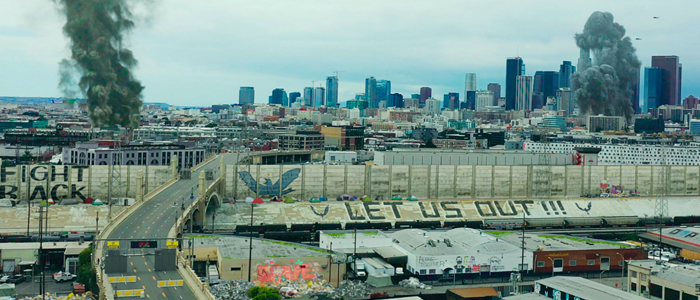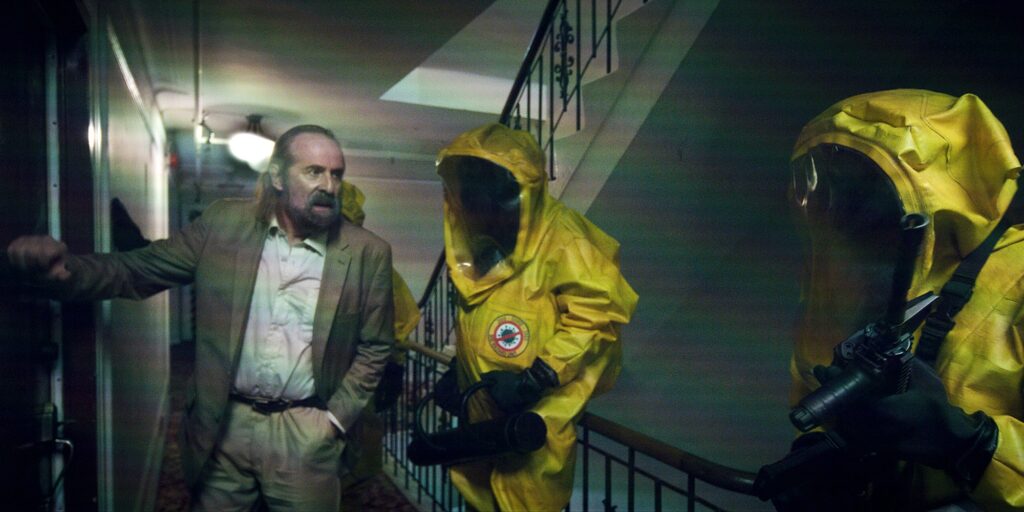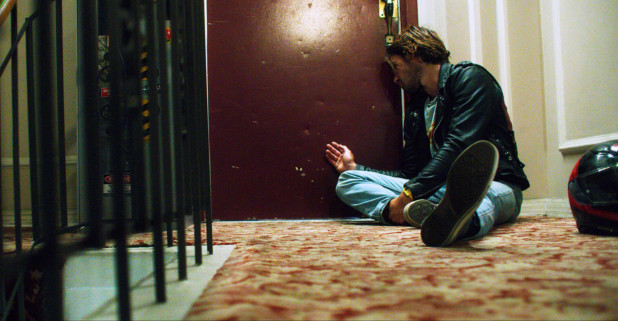Writer/director Adam Mason’s Michael Bay-produced, Corona-thriller Songbird is spreading menacingly onto streaming platforms this week. Honestly, it’s a bit like waking up to a 9/11 joke on the morning of September 12th, only less funny.

Songbird is set in 2024, a bleak future where our old friend Covid-19 has mutated into Covid-23, a more infectious, far more dangerous strain of the virus, necessitating a state of perpetual quarantine and civil obedience across the world. In the midst of the pandemic, a couple of irritatingly good-looking, star-crossed lovers fight for their right to party, i.e., conspire to forge an immunity pass so they can escape to the fabled, ‘virus free’ sanctuary that is Santa Fe.
The audience is first introduced to virus-immune bike courier Nico (KJ Apa) as he scoots about a desolate Los Angeles, delivering various packages for quarantined rich folk like Piper (Demi Moore) and William (Bradley Whitford) Griffin; a bickering couple who make money selling highly prized, black- market ‘immunity bracelets’. Meanwhile, Nico’s girlfriend Sara (Sofia Carson) spends her days quarantined with her grandmother, organising her rapidly diminishing pencil collection and thinking of new ways to gaze adoringly into her phone screen. Alexandria D’addario also shows up as May, a struggling singer/songwriter in a thankless sub-plot with wheelchair-bound, ex-military drone operator Dozer (Paul Walter Hauser).

The cast all give committed performances. Which is good, because it falls entirely on their shoulders to sell the tasteless, gluten-free, paleo flatbread of a script they were handed. Undoubtedly owing to the film’s 3-month pre- production schedule, it is filled with endless, clumsy expositional dialogue (“You’re late, asshole!” “You just hate me because I’m immune”), flaccid, half-attempts at satire (“Stop messing around guys! Rich people need their shit!”) and hilariously over-zealous, unsubtle government officials (“A fever has been detected at your residence. Armed guards will be arriving shortly”).
Only the dependably Slavic Peter Stormare as the head of the ‘DOS’ is able to truly emerge with his dignity intact. He puts so much energy into his maniacal, monologuing performance that he manages to sell nonsensical threats like “Bag and tag the hag!”, “Roses are red. Violets are blue. You think you can hide. But I’ll find you!” and “Disobedience is spreading like a… tornado.” (apparently the screenwriters couldn’t think of another destructive force that spreads from person to person, which is a shame) with far more joie de vivre than they deserve.

As one of the first films produced entirely during lockdown, the filmmakers deserve token praise for navigating the coronavirus restrictions and utilising abandoned streets, mobile phone footage, POV cameras, doorbell cameras, handheld cameras and CCTV to capture the action in place of conventional set-ups. These visual tools, although restrictive, are well-integrated and feel organic within the context of the story, but the home-made aesthetic is periodically offset by sprinklings of Bay’s bombastic action aesthetic, which provides a few (mercifully short) jolts of excitement. Mason and co-screenwriter Simon Boyes have also crafted a tight, three act structure that keeps a relative focus on plot and suspense, and moves along faster than airborne pathogens at a White House garden party.
However, the central plot, much like the script, is rife with contrivances, coincidences and logical fallacies. The whole plot hinges on getting Sara an immunity bracelet and ‘escaping’ quarantine: got it. But there’s a small issue, in that she’s not immune. At least, not that we know of yet. The movie has already established how dangerous the virus is, but it also wants us to celebrate something that would expose both herself and anyone she encountered to the virus. Even in the golden, angelic glow of true love, this seems like a bit of a stupid plan. Don’t worry though; as it turns out, she actually is immune, but this fact raises more questions than it answers. Did she know she was immune? If not, then how did Nico find out he was immune? Why hasn’t she gone through the same process? Can’t the phone app – which is apparently sophisticated enough to detect brain anomalies via the camera – tell if someone’s immune? And who the hell is Boomer, and why does he even appear? Frustratingly, these questions remain unanswered.

Understandably, Songbird has received criticism from all sides, for fuelling the worst kind of anti-lockdown conspiracies and seeking to profit from an ongoing health crisis; a subject which is still far too close to home for many audiences. The truth is, both are valid complaints, and however hard it tries, Songbird is never able to soar above these criticisms because it remains hamstringed by the limitations of its own rushed production. Good performances and guerrilla screenplay can only mask a noxious script for so long.
Any filmmaker dealing with a subject so heavily politicised and emotionally raw has to expect scrutiny, and frankly the subject deserves more time and attention than it received here. The dizzying high-wire act of balancing empathetic storytelling and emotional nuance with exciting filmmaking, all without coming off as exploitative or gratuitous would be better left to someone like Alfonso Cuaron, David Fincher or Paul Greengrass. Good films – maybe even great ones – will be made about these confusing times, but Songbird will likely only be remembered for unceremoniously kickstarting the sub-genre with a cough, a splutter and a thud. Avoid like the ‘rona.
Songbird is out now.
